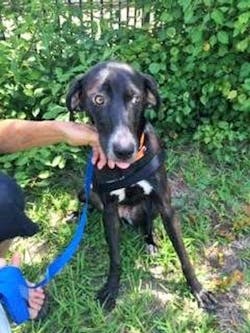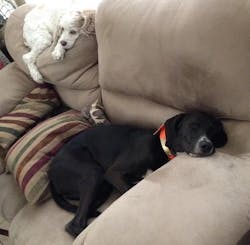Louisiana Catahoula Leopard dogs, the state's official dog, are normally inquisitive, energetic, loving and independent - but not Scarlet. This one-year old, 40-pound mix was abandoned, abused, despondent, cowered from strangers and in constant pain from untreated mouth sores. Her only hope for recovery was prolonged medical treatment and a family that wanted her.
A group of truck drivers, crisscrossing the United States for their daily jobs, were able to work together to save Scarlet's life.
After being rescued by an animal relief agency and treated by a veterinarian for five months, Scarlet was available for adoption from Logansport, LA. She was skinny, still wary of people, sitting in her cage waiting for an adopter willing to take a chance on a dog with a damaged body and spirit.
Enter a woman named Tania in Reno, NV. She had recently lost her own Catahoula Leopard named Bella Luna to kidney failure and had a place in her heart for another dog when she saw Scarlet's photo on a Humane Society website. The two dogs even looked the same, but with dog transport costing hundreds of dollars, how could Scarlet travel the 1,853 miles to her new home?
Through a series of pickups, drop-offs and 'layover' houses, truck drivers – some even using their own personal vehicles – carried and cared for the sometimes visibly shaking, scared dog who hadn't been outside the shelter area for months, as she made her way to her new home. At first, Scarlet was afraid of entering a semi, but by the end of her trek which included four drivers, three layover homes and nine states, Scarlet didn't think twice about hopping into a cab.
Scarlet is one of 888 pets over the past ten years who have been transported by trucker volunteers working with Operation Roger based in Joshua, TX.
Founder and truck driver Sue Weise was on the road when she heard about pets who were lost or abandoned during hurricane Katrina and she said: ""Lord, what can I do? I'm just a truck driver?" The word 'transport' popped into her mind. "I approached one of my other friends, also a female driver, and my two daughters and they had a bigger vision, and they talked me into going on a trucking talk show to talk about the idea. I was scared out my wits. I was trembling so hard that my bones actually hurt. At the end of the show, we had 12 possible volunteers and that was the start of it."
Wiese says that while almost 900 transports - not just pet dogs or cats but ferrets, chinchillas and rabbits – may not seem like a lot in 10 years, it's a logistical challenge to coordinate drivers and layover houses considering that all it relies on volunteers who may be driving different routes all of the time. "Very few of our drivers are dedicated, and some places in the country are tough to service. The I-5 corridor, I-95, I-10 and I-94 in North Dakota are very difficult areas."
Wiese, who no longer drives after 16 years on the road, says that pets need transport for different reasons. "Domestic violence for example. The woman and her children have to leave in a hurry and they can't take their pet. There's car accidents. Sometimes it's people who are moving, but they don't have a place for the pet at first. Once they find a place then they want their pet to be with them."
Wiese prefers a straight shot, one driver picks up and delivers, but that's not always possible. "The next preferred is driver to driver. And then if there's a gap, where one driver can pick it up and can't deliver, and another can deliver it, but they can't meet, then we have a layover home. Recently, it took four drivers and three layover homes, which was a record."
There is no charge to the pet owner but there is a minimum donation $40 for the application fee. "Compared to hundreds of dollars, that looks pretty good," she says.
Wiese notes that many more drivers would like to volunteer but their companies won't allow it. "Usually it's because some driver in the past let their dog tear up the truck. And it makes sense. However, we do put our drivers through what we call 'Operation Roger University.' Over the years, we have learned what to do and what not to do to keep the pets, drivers and their trucks safe. If drivers follow the experiences and the suggestions made by other drivers then they won't have a problem. If they don't, if they feel like they know more, they'll have a problem every time."
Wiese says that having company in the cab can help drivers keep mentally alert and safe which was her experience. The group is named after Roger her Manchester terrier who kept her from going 'zombie' and talking to the flies on the steering wheel. As much as the pets need drivers, the drivers need company, she says.
"More than anything else," she concludes, "we just need more drivers willing to volunteer so we can continue to unite owners with their pets."
About the Author

Larry Kahaner
Larry Kahaner is an author, journalist, and former FleetOwner contributor.

